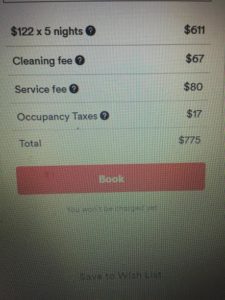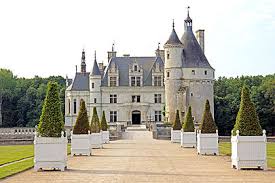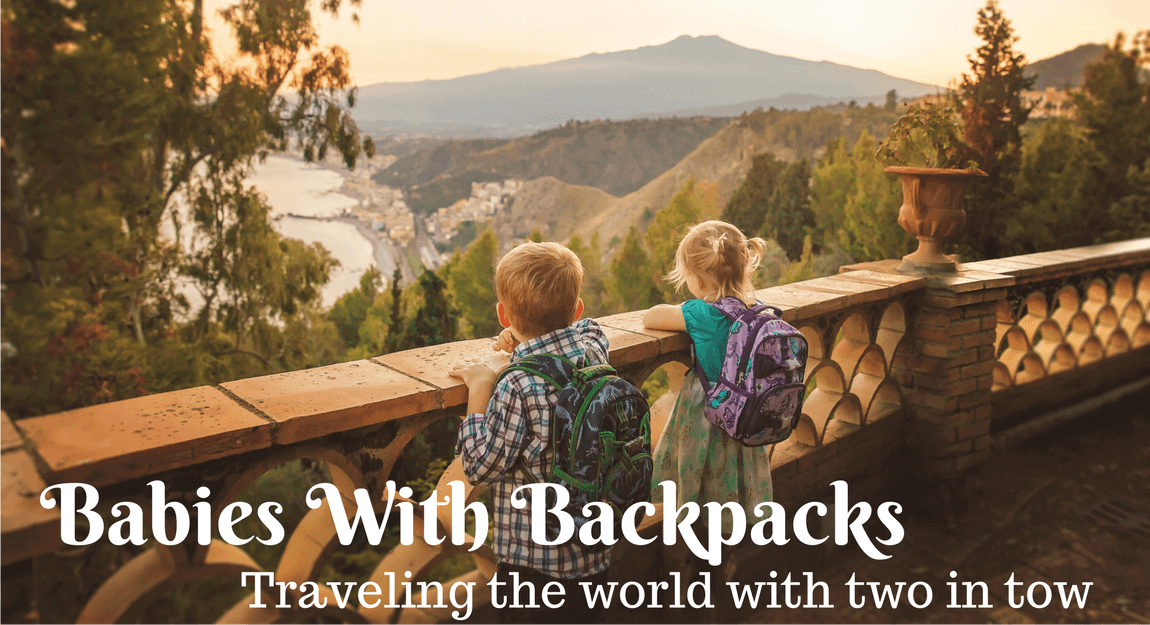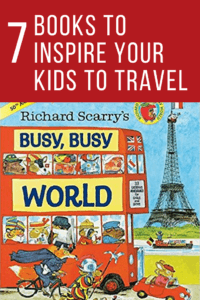As you may have noticed, we’ve been taking it a little easier on weekend trips since we moved into our house — a combination of having things to do around our house now, and just plain being tired from the holiday season. That said, we’ve hardly been idle on the trip-planning front. So far we have plans to spend 9 days in France as a family in the spring, a week in Ireland with my in-laws a month or so later and plans to attend Oktoberfest in Munich with my family and some friends. We’re also kicking around a long weekend in Cefalu, a beach community in Sicily a couple hours away.
Other than picking a flight, our biggest concern for trips is deciding on accommodations. Pre-kids, we had a pretty simple process for deciding where to stay on our (rare) trips: go to a hotels.com or similar website, type in a destination and filter by price, proximity to city center and (most importantly) reviews. Easy-peasy.
Since having the kids, however, we’ve acquired a ton more criteria that makes it slightly more complicated to pick a place. For starters, a standard hotel room no longer cuts it because a) the kids go to bed much earlier than we do — meaning we’d have to sit there in the dark and silence after like 7/8 pm and b) sharing a room with the kids is basically the worst (although less awful than when they were younger).
So for the most part, we’ve found we mostly prefer renting apartments through AirBnb. So far we’ve rented one in Modica (on Sicily) and in Rome, and both were excellent.
By the way, if you haven’t used AirBnB but want to, please consider using my referral link. You get a $40 travel credit for your first booking, and I get $20. www.airbnb.com/c/kaseyh50
Pros:
- More space. If we are renting an apartment, we’ll usually go with a 2 bedroom so the kids have their own space to sleep. They also often have more than one bathroom, which can be helpful.
- Neighborhood feel. I absolutely think you get a more authentic experience in an apartment versus a hotel, which tend to be isolated in tourist areas and surrounded by restaurants that are more geared toward tourists.
- Amenities. Especially with the kids, it is nice to have a kitchen. When we’ve taken vacations in the States and rented condos, we’ve usually done a shopping trip on the first day and picked up a bunch of food so that we could cook some of our meals at home and save money and aggravation. Even when not planning to do that, it is nice to have a decent fridge to we can stash leftover and have a cold beer waiting for us.
- Helpful hosts. So far, we’ve had pretty great experiences with hosts being willing to recommend restaurants, attractions, etc. In Rome, our host even arranged a early-morning cab for us so we didn’t have to worry about hailing one. We didn’t end up staying in the AirBnB we booked for our canceled anniversary trip to New Orleans, but our host for that one had even offered to recommend a babysitter so we could go out one night.
- Cost. Usually, the price is more or less similar to what we’d pay for a hotel; sometimes, there are even great deals to be had. In Rome, for instance, we ended up getting a gigantic apartment for about 130 euros a night, which resulted in our friends from Naples, their three kids and their babysitter all being to stay overnight with us. (Worth noting: we did get hit up for about 100 extra Euro because the host noticed we had way more people than on the booking, but it was still SIGNIFICANTLY cheaper than the at least two extra hotel rooms we would have needed for our friends to be able to stay).
That said. It isn’t necessarily all upsides. Some things to consider.
- Comfort. So far, we’ve mostly found our rentals to be comfortable. That said, you may well end up with scratchy blankets, thin mattresses, crappy pillows, etc. For some reason in Italy, having a top sheet isn’t necessarily standard. We were very surprised in our AirBnb in Rome to find that we only had the fitted sheet covering the mattress and the comforter; according to our friends from Naples, this is super common. If you are at all finicky about stuff, you might not love the AirBnb experience.
- Location. We put a premium on being in a good location, but that can admittedly take a fair bit more research than when booking a big-name hotel because you have less assurance that you are going to be a good neighborhood/enough security. It isn’t a problem as long as you take time to read reviews, Google the neighborhood, etc. but it obviously takes more a time investment to research, especially if you are booking in a bigger city.
- Fees. I have to admit that the fees on AirBnB are a little frustrating. When booking our Paris trip, I was annoyed when I realized that factoring in the cleaning/service fees and taxes generally raised the advertised nightly price for a room by as much as $30 to $40 per night. Another note on cost: it is not always cheaper to rent an AirBnB, especially if you are just two people or two people and a baby traveling.
 Just as an example, this one is $122/night but with all the fees factored in it comes out to $155/night. Grr.
Just as an example, this one is $122/night but with all the fees factored in it comes out to $155/night. Grr. - No rewards (generally). While AirBnb bookings are coded as “travel” by credit cards — meaning you can get bonus points with credit cards (like the Chase Sapphire Reserve) that offer rewards for travel expenditures — you don’t have a loyalty program like Marriott/Hilton/SPG. Even Hotels.com offers you a free night after you book 10 nights through their website. An exception: apparently you can now earn one Delta Skymile per dollar spent by booking your AirBnb through their portal. It isn’t necessarily a lot, but it is something. Naturally, I only discovered this after booking Paris!
Hotels, on the other hand, have some pretty obvious upsides. In this instance, I’m focusing more on brand name hotels versus the independently-run hotels, which may be less standardized. I haven’t visited a lot of these — with the exception of six weeks in one here in Sicily — so I don’t feel quite qualified to comment extensively on these yet.
- Ease of check in. With check-in desks manned 24/7, you can generally check in whenever you arrive. For example, we are arriving in Dublin at about midnight, so we’ll be spending the first night at a hotel near the airport. Also, while you don’t necessarily get to check in until mid-afternoon, we’ve found that hotels are generally willing to take your luggage off your hands if you arrive in the morning. Chris and I arrived in Paris for our honeymoon at sometime like 7 a.m., and our hotel was very happy to stick our bags behind the front desk and watch them til we got back. That’s not to say this can’t happen at an AirBnb — in Rome we dropped off our bags in the morning while they were cleaning — but if anyone else had been occupying the room at that time or the host hadn’t been willing to show up early to let us in, we’d be out of luck.
- Generic comfort. I’m not going to say you are always going to be clean (we’ll still never return to La Quinta because of the nasty wet carpet and moldy smell at one in Tennessee) or comfortable (we had to buy a mattress topper for our bed at the hotel we spent six weeks at in Motta Sant’Anastasia), but if you are staying in a brand-name hotel they are generally going to be fairly standardized. If you are unhappy with an experience, you can complain to corporate. You can pretty much count on having sheets.
- Amenities. Someone else cleans up after you and brings fresh towels, enough said. Also, a lot of hotels offer free breakfast, which saves you time, money and the annoyance of cleaning up. The spread at our Motta hotel was our favorite thing. And our Bloomington hotel had free booze and dinners four nights a week too.Another benefit, sometimes: babysitting available at a fee. We haven’t used this yet, but it was a deciding factor for settling on a hotel in Munich since we’d love to have one night to hit up the beer tents without the kids to worry about. Assuming we ever get a reservation — more on that later.
- Points and rewards. Basically the opposite of my complaint about AirBnb; if you are brand loyal, you can rack up points to use towards free nights. Using points or free night certificates to cover some or all of the prices of your accommodations can also be a huge cost-saver, since that is often going to be your biggest expense. For example, finding AirBnBs during Oktoberfest in Munich was already slim pickings even when I started looked at CHRISTMAS time so we moved on to hotels pretty much immediately. Prices were exorbitant already, but it turned out that I could use Chase Ultimate rewards points to pay which, at least, made me feel better about it. ALSO, if you are thinking about booking through a site like expedia/hotels.com I HIGHLY recommend you go through Ebates first. As I outlined in this post, the site cuts you a “big fat check” for using it as a shopping portal. So far, by booking through there I’ve received approaching $150 back, mostly thanks for our long stay at the Bloomington hotel (tragically, we didn’t book the Motta one through there). If you’d like to join Ebates, I’d very much appreciate it if you considered using my referral link: https://www.ebates.com/r/KAHUSK2
Cons:
- Space. The biggest perk of renting an apartment is the obvious con of a hotel. If you just have one big room, there is nowhere to go when the kids are asleep. Some hotels offer two-bedroom options, but those are harder to find (and more expensive). If you are going the hotel route with kids, my recommendation would be to spring suite with at least a sofa bed. You can put the kids to bed in the bedroom and move them to the sofa when you want to sleep, or stick them on the sofa bed and stick to your own room. If you opt for the latter, Chris and I recommend filling your sink with ice and bringing your beverages and snacks into the bathroom to save yourself a stealth mission later.
- Cost. A nicer hotel or one in a premium location can cost significantly more than an AirBnB; this is amplified if there is a big event happening or if you want a fancy hotel. Also, hotels may not let you book a standard room with two kids, so you’re looking at a bigger cost there because you’d need a suite or connecting rooms. (We haven’t tried the latter, btw — it seems better suited for older children).
- Less charm. You aren’t necessarily getting a neighborhood feel in a hotel in a tourist area.
Obviously there is a whole world of other options — hostels, bed and breakfasts, etc. — but it was mostly between these two options for our upcoming France and Munich trips (Dublin is still to be decided). We ended up settling on an AirBnB apartment near Montemarte for five days in Paris, followed by one night in a hotel in Tours (because we’ll arrive in the evening and it is easier) and renting a cottage in the countryside in the Loire Valley.
We actually got very excited about the idea of staying in a castle-hotel in Loire, but ultimately we couldn’t find one that was simultaneously in the area we wanted to be, had availability on our dates and didn’t come with a price tag that made me gasp.

Wouldn’t mind staying at a place like this!
In Munich, we are only staying for three days and were motivated mostly by convenience, being able to pay with points because of the elevated Oktoberfest pricing and the availability of babysitting. Thus, a city-center hotel with a sofa bed for the kids. It may not be the most comfortable, but at least there will be beer.
And just a reminder … if you haven’t used AirBnB but want to, please consider using my referral link. You get a $40 travel credit for your first booking, and I get $20. www.airbnb.com/c/kaseyh50








2 thoughts on “Hotels vs. Apartments vs. Castles: Planning a Trip”
Looks like you’ve done a good job planning for 2017 travel. What an exciting new year.!
Have fun!
[…] mentioned plenty of times before that we tend to prefer apartment rentals for a lot of reasons, one of which is that we don’t like sharing a room with our kids. Um, […]